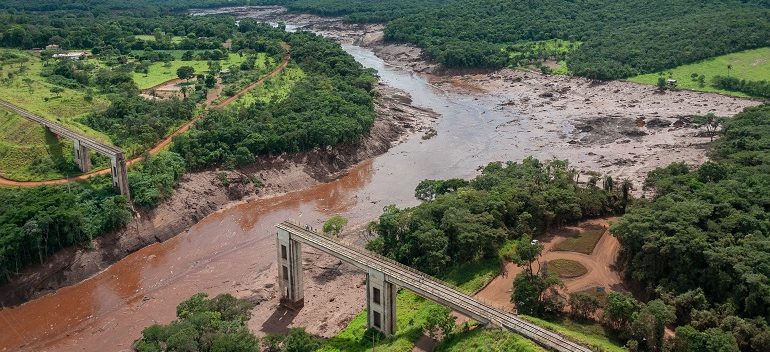
STATEMENT
Brazil: UN Special Rapporteur urges Government and multinationals to face up to their responsibility
January 16, 2020 – In a statement at the end of his trip to Brazil in December 2019, the Special Rapporteur on human rights and the management and disposal of hazardous substances and wastes held Vale, a multinational company, and the Brazilian Government responsible for the Brumadinho dam drama in January 2019.
In March, CETIM brought the breach of the Brumadinho dam, owned by the multinational company Vale, in the State of Minas Gerais, before the UN Human Rights Council. In collaboration with the Geneva representatives of affected populations in Brazil (notably the Movement of People Affected by Dams, MAB), CETIM accused Vale of criminal liability for this tragic event and organized a meeting with a number of Special Rapporteurs to ask them to go to Brazil to investigate (see article published in CETIM Bulletin No. 59).
CETIM welcomes the visit by the Special Rapporteur on the human rights implications of the environmentally sound management and disposal of hazardous products and wastes, Baskut Tuncak, to Brazil. In an initial statement published after his trip, he took a position reflecting our own, stating clearly that Vale could have prevented the breach of the Brumadinho dam.
“After 5 years of listening to communities whose rights have been abused by businesses, in my capacity as a UN Special Rapporteur, I have never seen or heard trauma to the extent of what this Brumadinho community is experiencing”, said Baskut Tuncak.
On 25 January 2019, 272 people died when the Córrego do Feijão dam in Brumadinho burst, burying them under nearly 10 million cubic metres of mud. More than 200 of them were Vale workers taking their break in the cafeteria adjoining the dam.
“From the experiences confided in me by the community, it is clear that the victims are not only the 272 mothers, fathers, sons, daughters, husbands, wives and unborn children who died. Far from it. The entire community has been victimized.”
A “preventable, predictable” crime
The Special Rapporteur’s conclusion regarding the breach of the dam left no room for doubt: “What happened in Brumadinho must be investigated as a crime. This was not an accident. Like many inside and outside Brazil, I believe this disaster was ‘preventable and predictable.’ ”
In support of this conclusion, the Special Rapporteur referred to another tragedy, also non-accidental, namely the bursting of a dam operated by Samarco, a joint venture by Vale and BHB Billiton in Mariana, in the Rio Doce basin.
Baskut Tuncak also pointed out that it is the State that is primarily responsible for protecting the population from the activities of business in Brazil. The Government relies on information provided by businesses, but these have lost all credibility since the dam disasters.
Hazardous substances
In his statement, the Special Rapporteur expressed deep concern over the extensive use of hazardous substances in Brazil and described the serious consequences for health and the environment.
“As in countries around the world, thousands of premature deaths in Brazil and millions of diseases and disabilities result from preventable exposures to toxic pollution and other hazardous substances and wastes, including the release of untreated sewage along sections of the north eastern beaches. However, many do not even know they are victims.”
The Special Rapporteur recalled that information about hazardous substances is a human right, in particular for victims, who are denied access to studies and reports, as happened in the Mariana disaster, for example.
Catch-22
Baskut Tuncak was particularly concerned about “the tendency to ignore the profound impacts of economic expansion on rights of indigenous peoples who rely on the environment and biodiversity.”
He also expressed deep concern at the plight of environment defenders in Brazil, which was “ranked as the deadliest country” for them. “Affected communities are caught in a lethal catch-22: either risk death from exposure to toxic pollution, or risk death for defending their right to a healthy environment. I take note of affirmations made that the number of deaths of human rights defenders has decreased. However, I am not convinced this is true and serious concern remains that attacks, intimidation, and threats have increased.”
Government to blame
The Special Rapporteur’s statement clearly highlighted the role played by the Government in the catastrophic situation the country finds itself in: “There is a deeply concerning trend in Brazil of systematically dismantling environmental, labor, health and social governance structures over the past year. Key ministries have disappeared, with their responsibilities transferred to authorities with conflicting objectives. Relevant councils have been eliminated, while others have been retained but only after eliminating positions for civil society participation. Programs to promote alternatives to chemical-intensive agriculture have been eliminated. Budgets have been reduced, frozen or rendered inaccessible for critical functions aimed at protecting the health and environment of communities. Laws have been proposed to expand the extraction of natural resources from the lands of indigenous peoples. Promised protections of environmental and occupational health have been shelved and the role of labour inspectors diminished. All of which is quite shocking after a disaster such as the one in Brumadinho at the beginning of the year.”
“Steep path of regression”
“The gravity of the current situation in Brazil has left me with a heavy heart.”
It is with these powerful, unambiguous words that Special Rapporteur Baskut Tuncak concluded a statement reflecting his profound consternation.
“While progress has been made around the world, it is inescapable that Brazil is currently on a steep path of regression, heading towards an increasingly toxic future.”
A detailed report on his mission to Brazil will be published in September 2020.
In CETIM’s view, the example of Brazil is yet another demonstration of the need for a binding international treaty on transnational companies, in order to prevent, and where necessary remedy, such violations and their tragic impact on populations and the environment.